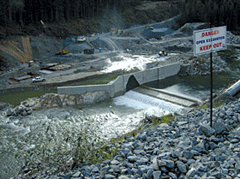
Tom Rankin, president of Save Our Rivers Society, used to have to pester people to get his message out. Now he has plenty of citizens eager to listen.
A keystone of B.C.'s low-emissions energy strategy is power generated by private "run of river" plants driven by rushing water. But what's good for fighting global warming has raised various other fears for Rankin and a diverse range of groups opposed to the projects.
Rankin turned activist when he caught wind of a private hydro development planned for Ashlu creek, just north of Squamish where the rancher calls home. He went to meetings, got on the phone and formed the society to stop what he sees as the "theft of B.C.'s rivers."
One of his converts was Gwen Barlee of the Wilderness Committee, who says Rankin's persistent calls prompted her to look more closely at private hydro projects.
Barlee admits she was initially pleased about BC Hydro's first call for green power proposals in 2003, the year the contract for Ashlu creek was granted.
That changed when she actually saw the project construction site.
"I thought of a little turbine in a stream," she says. "They're called run-of-river projects . . . they should be called river diversion projects."
While environmental and conservation activists have criticized the touting of these projects as "green," a number of other interest groups are mobilizing against private power for other reasons.
"We're seeing a really diverse group of people," says Barlee. "It's indicative of the depth and breadth of private power producers across the province."
Too much, too fast?
Right now there are 35 private power projects up and running, another 45 have been granted contracts and more than 500 water licenses -- obtaining one of these is the first step for hydro project development -- have been bought.
This is too much, too quickly with too little consultation with stakeholders, say opponents. There have been four requests for moratoriums on private hydro development in the province.
In 2005, the Squamish-Lillooet regional district requested a moratorium on "high value" streams in the Sea-to-Sky corridor "until a consensus-based regional strategy is developed to predetermine which rivers are suitable for IPP [independent power producer] development . . ."
Last June, the Union of B.C. Indian Chiefs called for a moratorium on private hydro development until there was assurance of "transparent" consultation with First Nations and a review of the terms of existing water licenses.
Unions oppose privatization
The NDP, Wilderness Committee, Council of Canadians and Canadian Office and Professional Employees Union have also jointly called for moratoriums.
David Black, president of COPE local 378, says members have been rallying against BC Hydro privatization since 2002 when it launched BC Citizens for Public Power.
In 2003, one-third of BC Hydro jobs were outsourced to Accenture, an international management consulting, technology and outsourcing company.
Carleen Pickard, regional organizer for the Council of Canadians, says there is "widespread support" to stop the proliferation of privately owned hydro projects.
"This is the time for [a moratorium]," says Pickard. "The rubber is hitting the road. The call for a moratorium is not unachievable and it's entirely within the rights of citizens."
Power line would slice park
The latest battleground in this fight to halt private hydro development is a proposed project site approximately 100 kilometres from Vancouver, sandwiched between three provincial parks: Pinecone Burke to the north, Garibaldi to the east and Golden Ears the south.
Northwest Cascade Power Ltd., a subsidiary of Run of River Power Inc., is proposing a 161 MW hydro facility on eight tributaries of the Upper Pitt river.
The project proposal includes building a 43-kilometre transmission line that would cross the northern and southern tips of Pinecone Burke Provincial Park.
The park is designated class A, which allows for the least amount of disruption within its borders. Under the B.C. Parks Act, it's possible to move the borders of a park with a Park Boundary Adjustment Amendment. Run of River has requested such an amendment to allow for the transmission line.
"I anticipate that an amendment will come in some form in the spring session . . . and be debated in the legislature between Feb. 12 and the end of May," says Shane Simpson, Vancouver-Hastings MLA and the NDP critic for the environment and sustainable communities.
Run of River has scheduled the first of three open houses on Upper Pitt and the proposed park boundary adjustment for next Monday in Squamish.
Anyone can fill out a public comment application on the company's website.
Company: 'No feasible route alternative'
Jako Krushnisky, the president of Run of River Power Inc., didn't return calls from The Tyee.
The company's website states that if the amendment is approved, 52 acres would be removed from the park and designated a protected area, managed under a park-use permit.
The website also states that two transmission routes were considered, and "due to the project location and available BC Hydro interconnection points, there is no feasible route alternative that would avoid the need for crossing Pinecone Burke Provincial Park."
Both Simpson and Gwen Barlee of the Wildnerness Committee said they feel government will be watching public response to this project closely.
"We're hearing behind the scenes the government is getting nervous," says Barlee.
Minister: Citizens still own rivers
When asked for comment about public opposition to private hydro development, public affairs for the Ministry of Energy, Mines and Petroleum stated the government is not considering a moratorium and e-mailed The Tyee an opinion editorial from Minister Richard Neufeld about private electricity generation in B.C.
"IPPs may own their generating infrastructure but they do not own the rivers and streams. The people of British Columbia continue to own these water resources," states the letter.
"BC Hydro is currently looking at building and expanding electricity generation. It is moving to Stage 2 of reviewing the feasibility of the new Site C project on the Peace River. As well, BC Hydro has undertaken capital investments on several dam sites."
Irrigation worries
Stage two of Site C, which will consist of stakeholder consultation and project definition, will take two years. Construction -- if the project reaches that stage -- wouldn't begin for another seven, according the BC Hydro's website.
Harold Steves, a former NDP MLA who was integral in the creation of the Agricultural Land Reserve, lamented what he sees as the loss of the "best publicly-owned power system in North America."
Steves says he hears from farmers who are concerned about not having enough water to irrigate crops.
"I've got farmers contacting me saying that they're losing water rights," he says.
"They don't know how this could happen."
Water level concerns
Last September, a power project on Miller creek near Pemberton shut down and reduced the creek to a trickle. Alarm signals were re-routed to an office in Edmonton, but the incident went unchecked until local farmers alerted BC Hydro.
Andrea Barnett, communications coordinator for the B.C. Cattlemen's Association, said that although she receives many complaints about low water levels, none have been directly attributed to hydro projects.
People in the tourism and outdoor recreation sector are also worried about transmission lines, cleared construction sites and large pipes diverting water and spoiling wilderness destinations.
Chris Laustrup, a photographer, owns 120 acres on the Pitt River near Olsen creek. He, his wife Dianna and their young son moved there to "get away from society" and are currently building a wilderness retreat that will cater to other people looking for escape.
"I'm not an environmentalist, I'm a conservationist. I'm talking about a wise use of natural resources," he says.
Plea for land use plan
"My drive has always been to getting people up there, getting tourism up there," says Laustrop, who was the president of Tourism Pitt Meadows when the organization was in its infancy.
He says the area has the same natural attributes of Whistler and Squamish, but is worried the eco-tourism potential will be spoiled when private power producers move in without a land use plan in effect.
Laustrop says such a plan is necessary to ensure the area is developed appropriately -- and with no infringement on park land.
Jeremy McCall, executive director of the Outdoor Recreation Council of B.C. says he imagines public input on the Pinecone Burke proposal will be "deafening."
'Parks are supposed to be sacred'
The ORC represents about 100,000 direct and indirect members, says McCall. He says the organization is trying to be an "expert" source of information on the public consultation process for the Upper Pitt and other hydro projects.
"Really, parks are supposed to be sacred," he says.
"We're not trying to act politically, we're trying to make sure people know what's going . . . and do what they think they should do," says McCall.
First Nations see costs, benefits
There are certainly differing opinions among aboriginal leaders about what private hydro development means for their people.
Grand Chief Stewart Phillip says First Nations communities already in "dire straits" are particularly vulnerable to power companies that promise jobs, skills training and revenue sharing in exchange for land and water rights.
Last April, a 119 MW project on the East Toba river, north of Powell River, was approved after consultation with Klahoose Chief Ken Brown.
Brown said when the project proponent, Plutonic Power Corporation, expressed interest in developing Klahoose territory, it was like "the stars had aligned."
Plutonic is spending $34 million on an initiative to rebuild old logging roads and bridges that have been decommissioned for 20 years, something the Klahoose could never have afforded, says Brown.
"You sit around waiting for a treaty settlement or you step up to the plate," says Brown. "You interface with private business and create economic opportunities for people. I try not to focus on the divisiveness of it."
'Election issue' says grand chief
Phillip says private hydro development on rivers, streams and waterways "flies in the face of everything we consider important" and urged activist groups to reach "beyond the usual suspects" and let ordinary people know how privately owned power will affect them.
"We're 15 months out from the next election," says Phillip. "This issue has to become part of everyone's kitchen table talk."
Related Tyee stories:
- A 'Green' Threat to B.C.'s Rivers?
Touted by BCHydro as renewable electricity, the rush to install privatized 'micro-hydro' schemes may change the flow of 76 B.C. rivers. - BC's Billion-Dollar Wind Power Giveaway
We're heavily subsidizing private power developers. Will Californians profit big? - In Telkwa, Surviving Off the Grid
It's minus 34 tonight and the generator just quit. Why did we say no to Hydro?
Read more: Rights + Justice, Environment















Tyee Commenting Guidelines
Comments that violate guidelines risk being deleted, and violations may result in a temporary or permanent user ban. Maintain the spirit of good conversation to stay in the discussion.
*Please note The Tyee is not a forum for spreading misinformation about COVID-19, denying its existence or minimizing its risk to public health.
Do:
Do not: